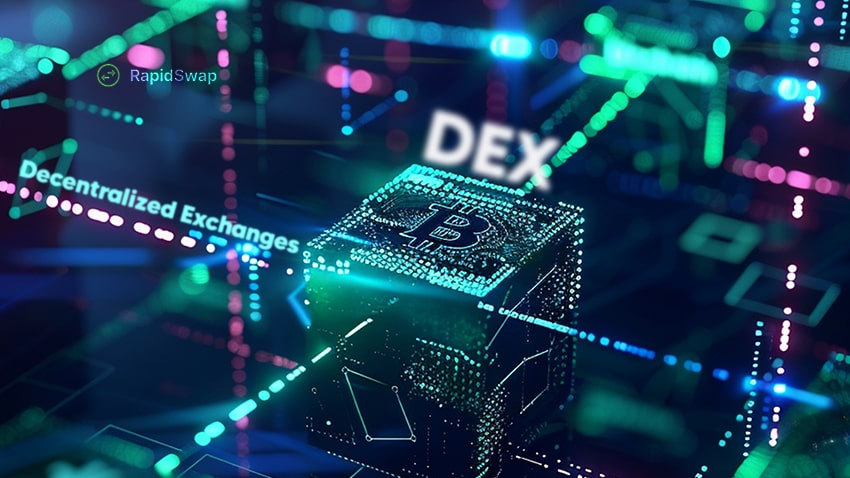Decentralized exchanges (DEXs) have become a significant aspect of the cryptocurrency world, offering a way to trade digital assets without relying on centralized authorities or intermediaries. As blockchain technology continues to evolve, DEXs are increasingly being recognized for the unique advantages they provide, such as enhanced security, privacy, and resistance to censorship. This article delves into the workings of decentralized exchanges, the different types of DEXs available, and the benefits they offer to users in the rapidly growing crypto ecosystem.
What Is a Decentralized Exchange (DEX)?
A decentralized exchange, or DEX, is a type of cryptocurrency exchange that operates on a decentralized network, typically a blockchain, without the need for a central governing authority. Unlike centralized exchanges (CEXs) like Binance or Coinbase, which manage and control users’ funds and transactions, DEXs allow users to trade directly with each other. This peer-to-peer trading model eliminates the need for intermediaries and provides users with greater control over their assets.
How DEXs Work
At the core of a DEX’s operation is the use of smart contracts—self-executing contracts with the terms of the agreement directly written into code. These smart contracts automate and enforce the terms of the trade, ensuring that transactions occur as intended without the need for a central party to oversee the process. By utilizing blockchain technology, DEXs ensure that all trades are transparent, immutable, and secure, offering users a high degree of trust and reliability.
Types of Decentralized Exchanges
DEXs can be categorized based on how they function and the underlying technology they use. The three main types of decentralized exchanges are Order Book DEXs, Automated Market Makers (AMMs), and DEX Aggregators.
1. Order Book DEXs
Order book-based DEXs function similarly to traditional exchanges, where buy and sell orders are listed, and trades are executed when matching orders are found. These DEXs can be further divided into two subcategories: on-chain and off-chain order books.
- On-Chain Order Books: In this type of DEX, the entire order book and transaction process occur on the blockchain. This method is highly transparent as all orders are publicly visible on the blockchain. However, it requires significant network throughput and low transaction costs, which makes it suitable only for certain blockchain networks like Solana. Examples of on-chain order book DEXs include Serum and Tonic.
- Off-Chain Order Books: These DEXs manage their order books off the blockchain, using external servers to match orders. While this reduces costs and speeds up transactions, it also introduces a certain degree of centralization, as the order matching is handled off-chain. Popular off-chain order book DEXs include dYdX and 0x.
2. Automated Market Makers (AMMs)
Automated Market Makers (AMMs) are a revolutionary approach to DEXs, eliminating the need for traditional order books altogether. AMMs use liquidity pools—pools of tokens provided by users—to facilitate trades. Prices are determined by smart contracts that adjust the price of assets based on supply and demand within the pool. This allows users to trade assets at any time, with liquidity always available.
AMMs have gained massive popularity due to their ease of use and low barriers to entry. Uniswap, launched in 2018, is one of the most well-known AMMs, and its success has inspired many similar platforms like Curve, SushiSwap, and PancakeSwap. These platforms offer low fees, permissionless trading, and a decentralized environment where users can trade without the risks associated with counterparties.
3. DEX Aggregators
DEX Aggregators are platforms that combine multiple DEXs into a single interface, allowing users to compare prices across different exchanges and find the best deals for their trades. By pooling liquidity from various sources, DEX aggregators provide users with better pricing and lower slippage, improving the overall trading experience. These platforms streamline the trading process, making it easier for users to access a wide range of assets and liquidity options in one place.
Benefits of Using Decentralized Exchanges
Decentralized exchanges offer several key advantages over their centralized counterparts, making them an attractive option for many cryptocurrency traders and investors.
- Enhanced Security: Since DEXs operate without a central authority, users retain full control over their funds. This reduces the risk of hacking, fraud, and theft that can occur on centralized exchanges.
- Privacy and Anonymity: DEXs typically do not require users to complete Know Your Customer (KYC) or Anti-Money Laundering (AML) procedures, allowing for more private and anonymous transactions.
- Censorship Resistance: Because DEXs operate on decentralized networks, they are less susceptible to government regulation or interference. This allows users to trade freely without fear of their transactions being blocked or reversed.
- Reduced Counterparty Risk: By eliminating the need for intermediaries, DEXs reduce the risk of default or non-fulfillment by a third party, ensuring that trades are completed as agreed.
Decentralized exchanges represent a significant advancement in the world of cryptocurrency trading, offering users a secure, private, and censorship-resistant platform for exchanging digital assets. By understanding the different types of DEXs and how they operate, users can make informed decisions about their trading strategies and take full advantage of the benefits these platforms offer. As the cryptocurrency market continues to evolve, DEXs are likely to play an increasingly important role in the future of finance, providing a decentralized alternative to traditional financial systems.

